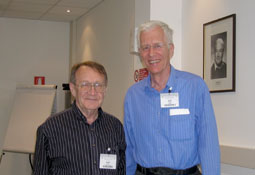Personal tools
News from ICTP 111 - Profile

ICTP has always been a crossroads for science and culture. Two colleagues reminisce about their first encounter in Trieste 40 years ago---and the course of their careers ever since.
Plasma Memories

When Roald Sagdeev and Lennart
Stenflo recently crossed paths at ICTP's Workshop on Theoretical
Plasma Physics, held this past summer, it was by no means their
first encounter. In fact, the workshop brought back a flood of
memories concerning another ICTP activity that took place 40 years
ago when Sagdeev, then a young Soviet professor, and Stenflo,
then a graduate student from Sweden, travelled to Trieste to participate
in the Centre's first major event: the Seminar on Plasma Physics,
held between 5-30 October 1964.
Sagdeev, who lectured both at the seminar then and the workshop
now, recalls that he arrived at the just-born ICTP as a young
professor eager to present his research findings to an expert
audience outside his home country.
"The three-day train ride," he recalls, "began
in Moscow and ended in Trieste. When I started my journey, Nikita
Khrushchev ruled the Soviet Union and when I stepped down from
the train in Italy, I learned, to my surprise, that Leonid Brezhnev
had replaced him."
"The workshop offered me an unprecedented opportunity not
only to exchange ideas with Western scientists but to begin to
nurture life-long friendships with physicists who shared a passion
for science. Marshall N. Rosenbluth from the United States, Brian
Taylor from the United Kingdom, and Bruno Coppi, who was born
in Italy but who spent a good part of his career in the United
States, became long-time friends and colleagues whom I first met
in Trieste in the fall of 1964."
Stenflo, then a young researcher at the beginning of his career,
arrived in Trieste with slightly different goals in mind. As a
graduate student, the seminar gave him his first opportunity to
interact with eminent scientists in a field that he would ultimately
call his own.
"Plasma physics was a hot topic," he recently observed,
"and it was good to have an opportunity to interact with
the community's best scientists. I could not help but be impressed
by the intelligence, enthusiasm and commitment of the seminar's
lecturers and participants."
Both Sagdeev and Stenflo have gone on to enjoy distinguished careers
of their own. Sagdeev has held prestigious positions both in the
Soviet Union and the United States. He served as director of the
USSR Space Research Institute in the 1970s and as Mikhail Gorbachev's
chief science advisor in the 1980s. Between 1989 and 1990, he
was a member of ICTP's Scientific Council, a post that he relinquished
after emigrating to the United States, where he became a professor
of physics at the University of Maryland.
Stenflo, who is a member of the Royal Swedish Academy of Sciences,
has been a professor of physics at Umeå University in Sweden
since the early 1970s. His fond memories of the Seminar on Plasma
Physics in 1964 led him---along with his fellow plasma physicists
Padma Kant Shukla, Ruhr-Universität-Bochum, Germany,
and Robert Bingham, Rutherford Appleton Laboratory, UK---to begin
organising topical meetings in plasma physics in 1989. Since then,
the three have organised six conferences in Trieste and three
others in Portugal and Greece.
"Forty years is a long time," notes Sagdeev, "and
I know that Lennart and I have matured a great deal since then.
And so has the field of plasma physics, which has turned from
a theoretical into an applied science. The Centre too has matured
now, ably serving a global scientific community more skilled and
more diverse than ever before."
"I like to think that we all have grown better in the years
since those youthful excursions in the early 1960s. This much
I do know. Activities like ICTP's Seminar on Plasma Physics helped
shape the lives and careers of a large number of scientists from
many different places, benefitting both scientists and societies
around the globe."